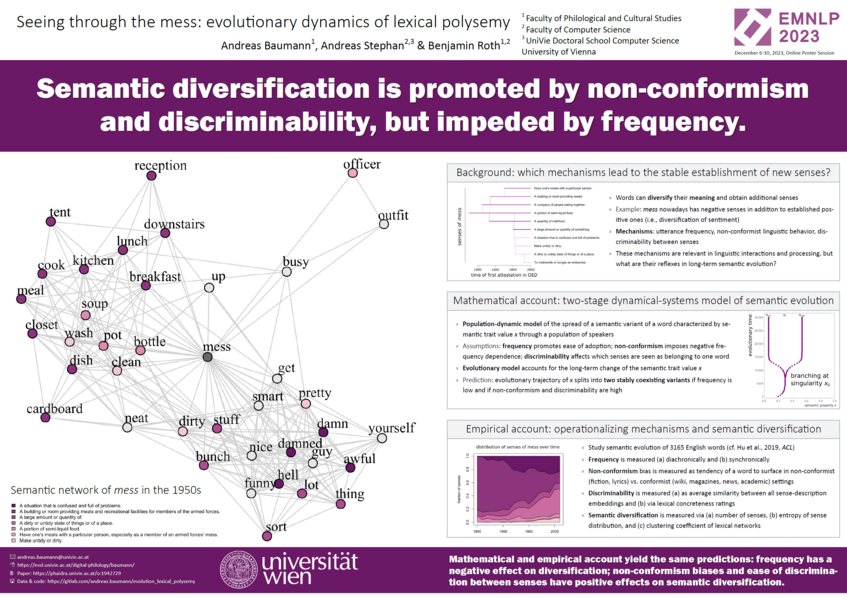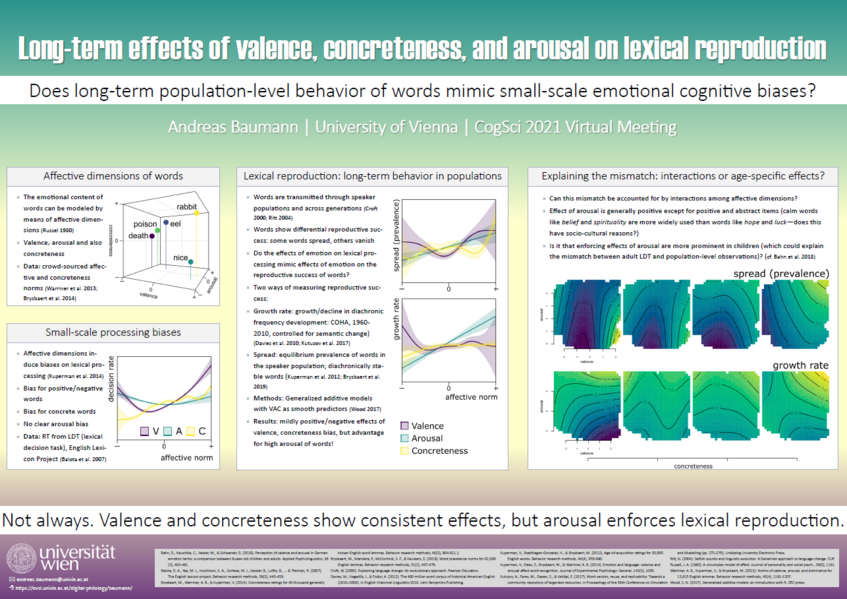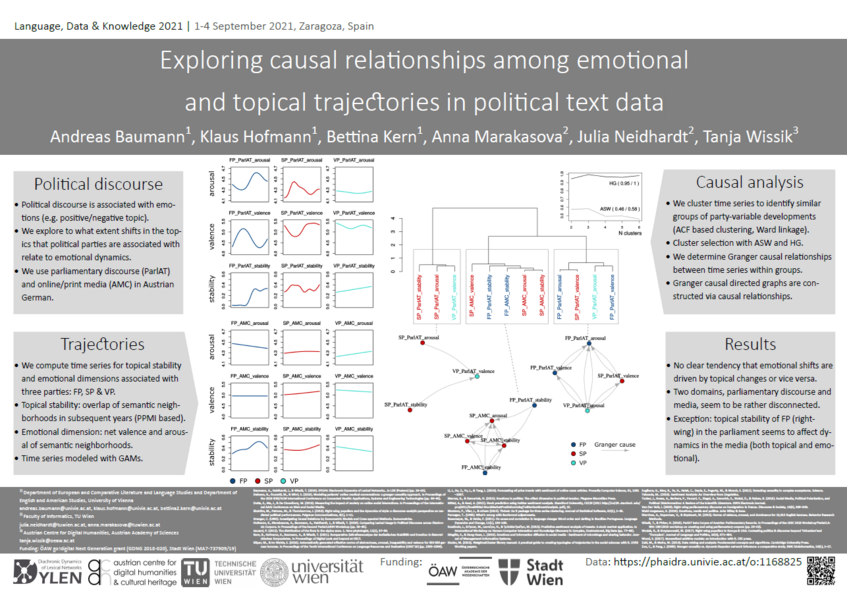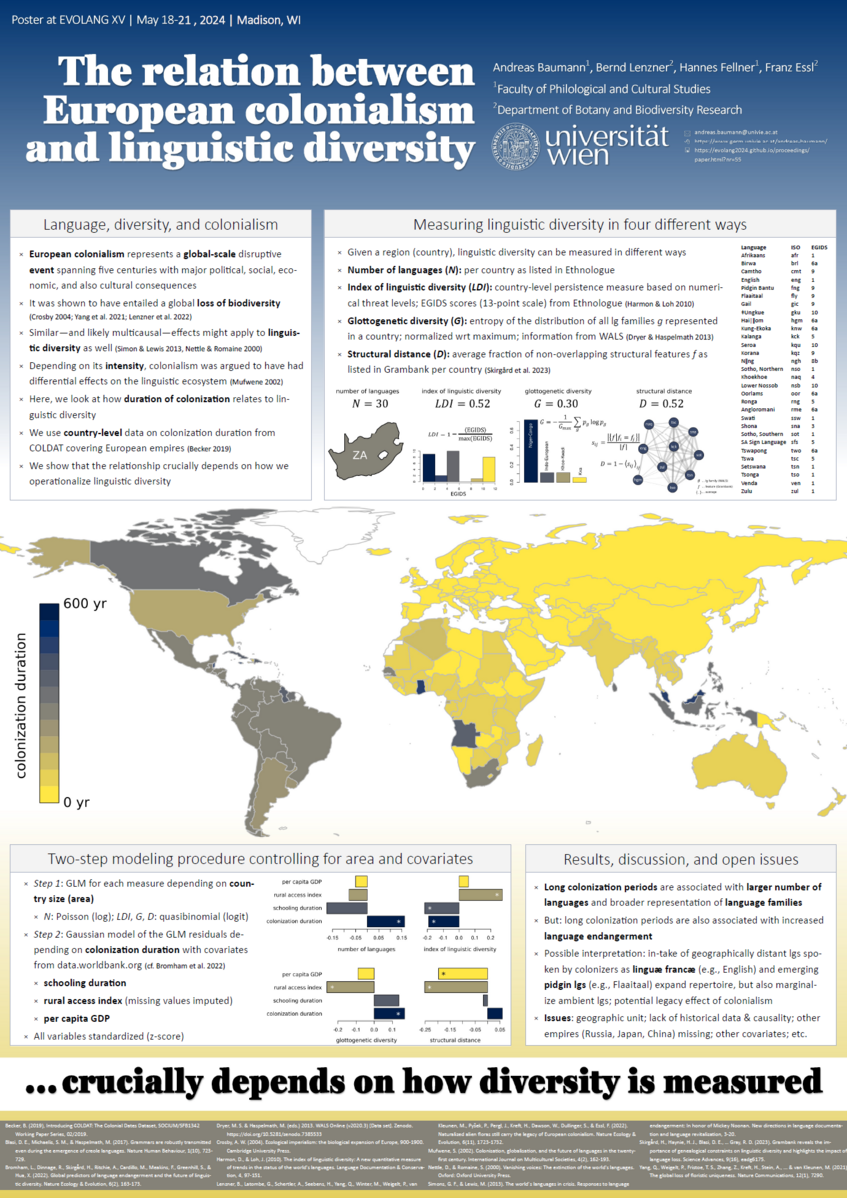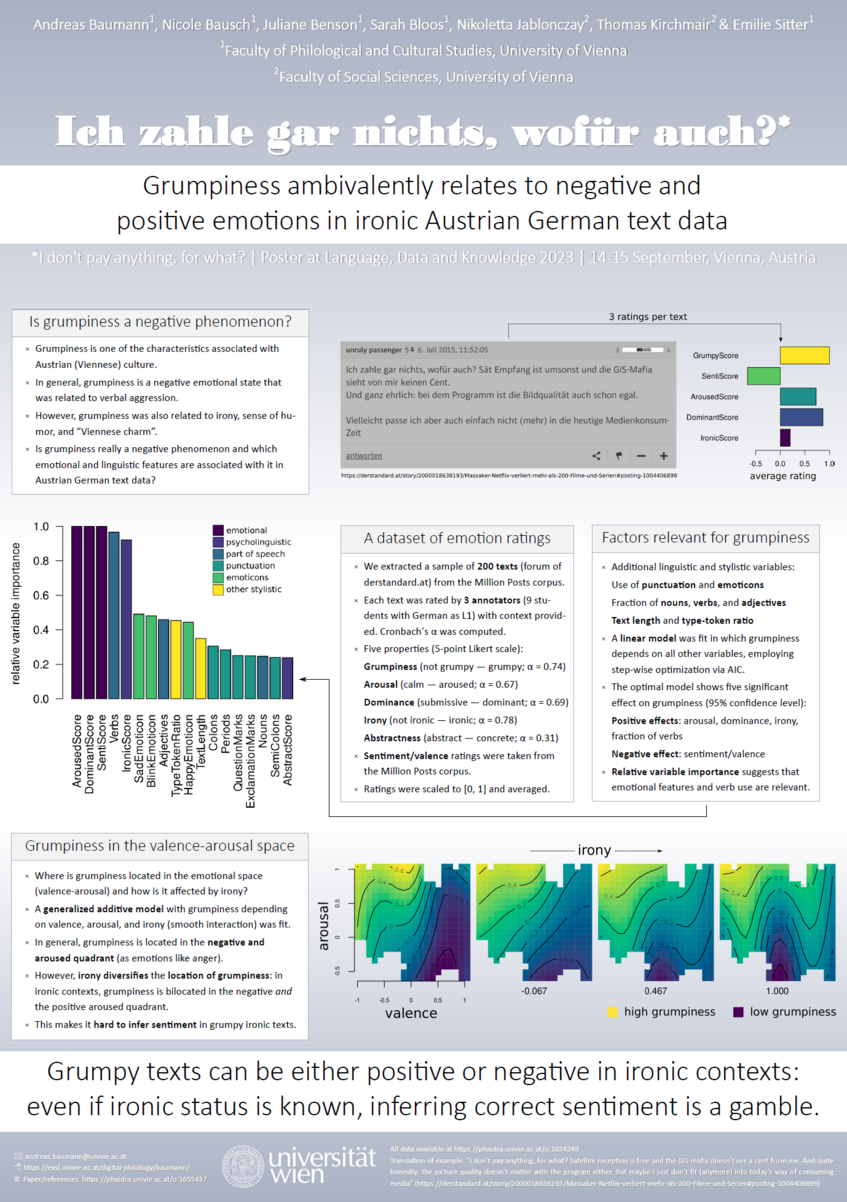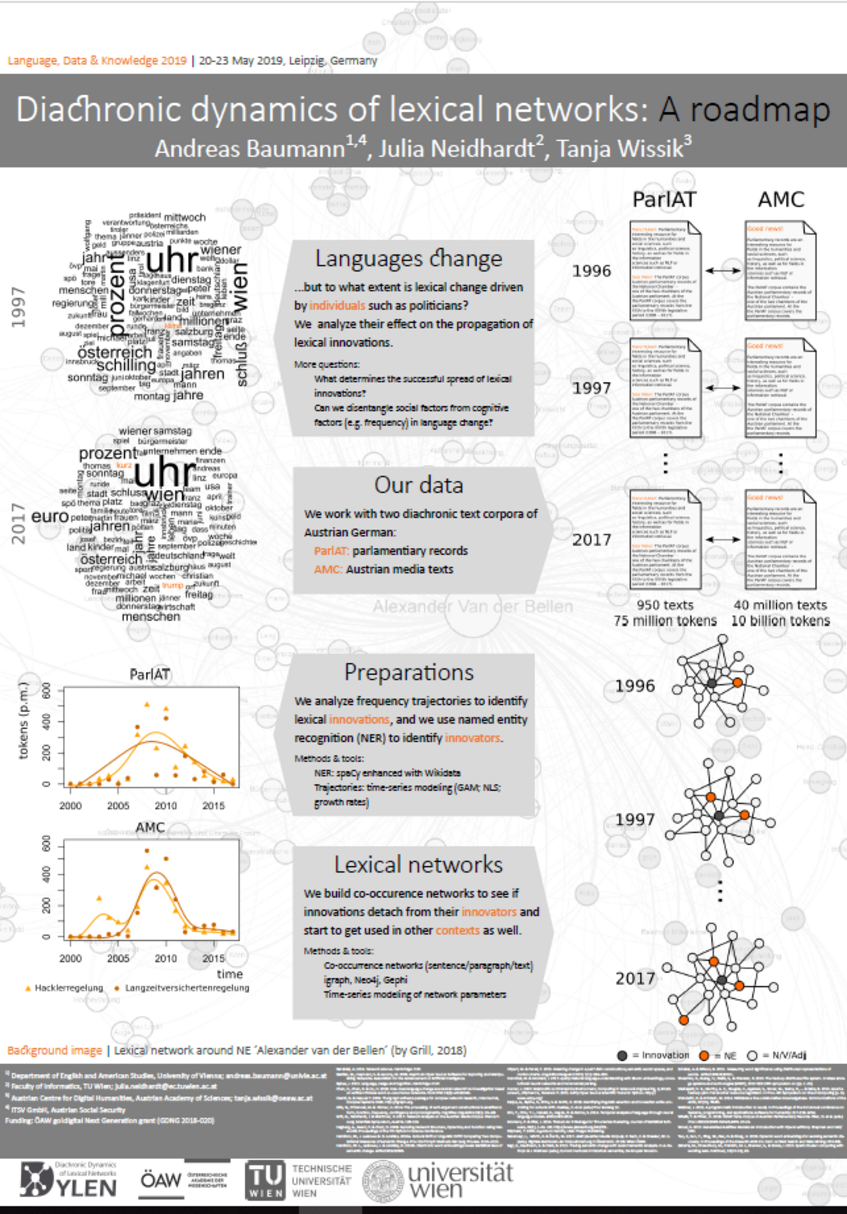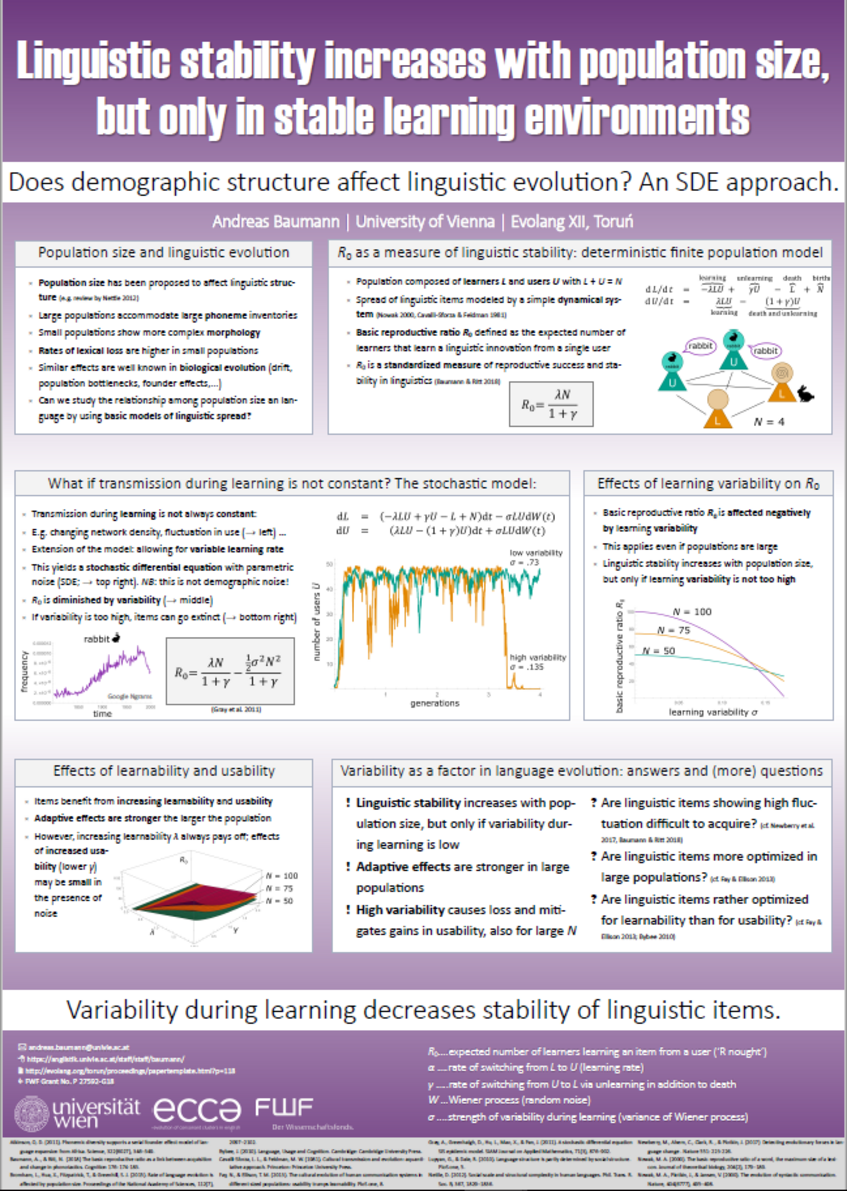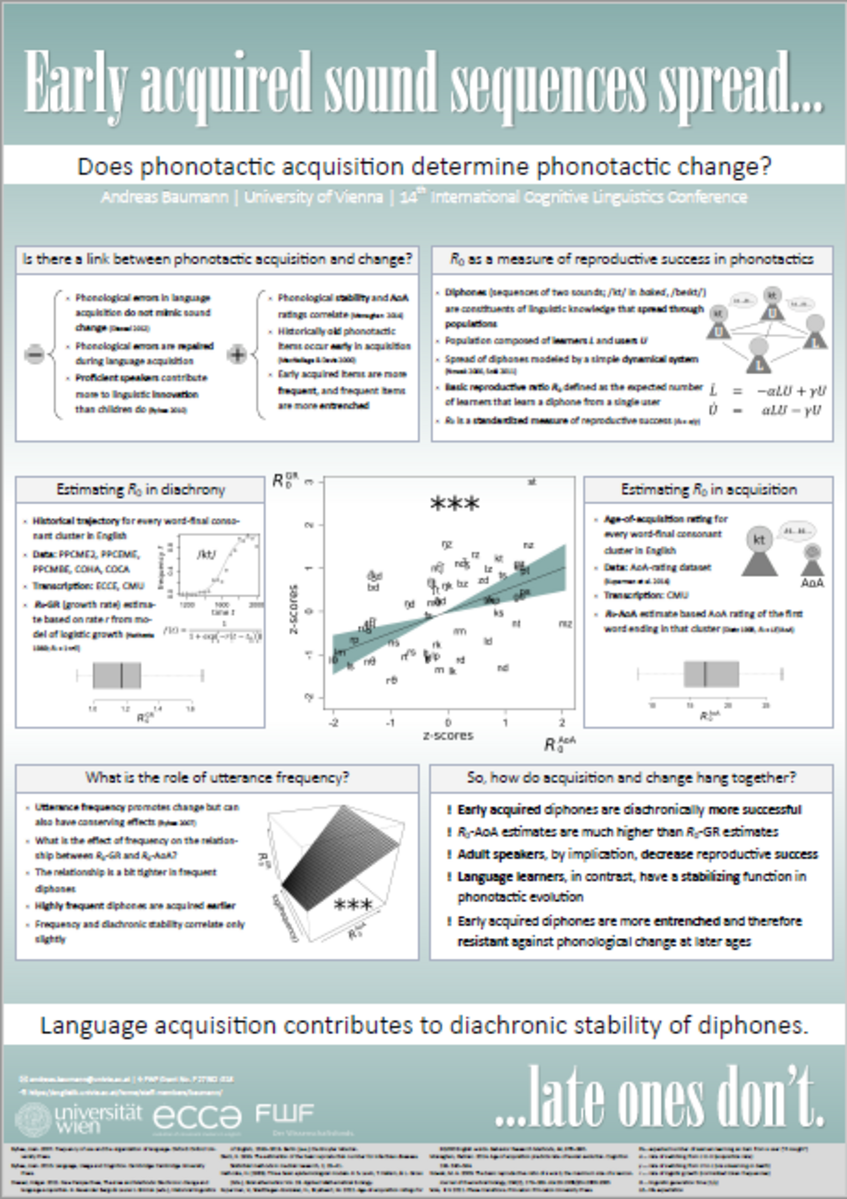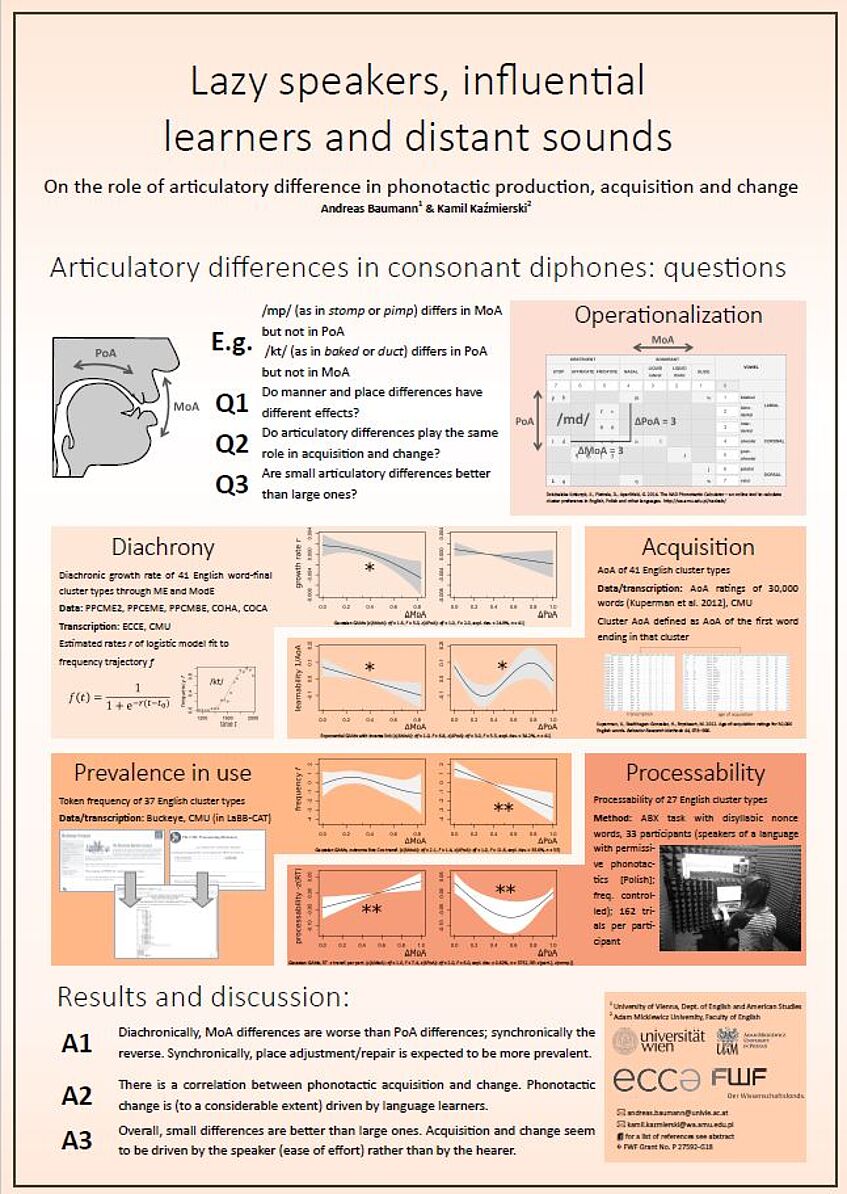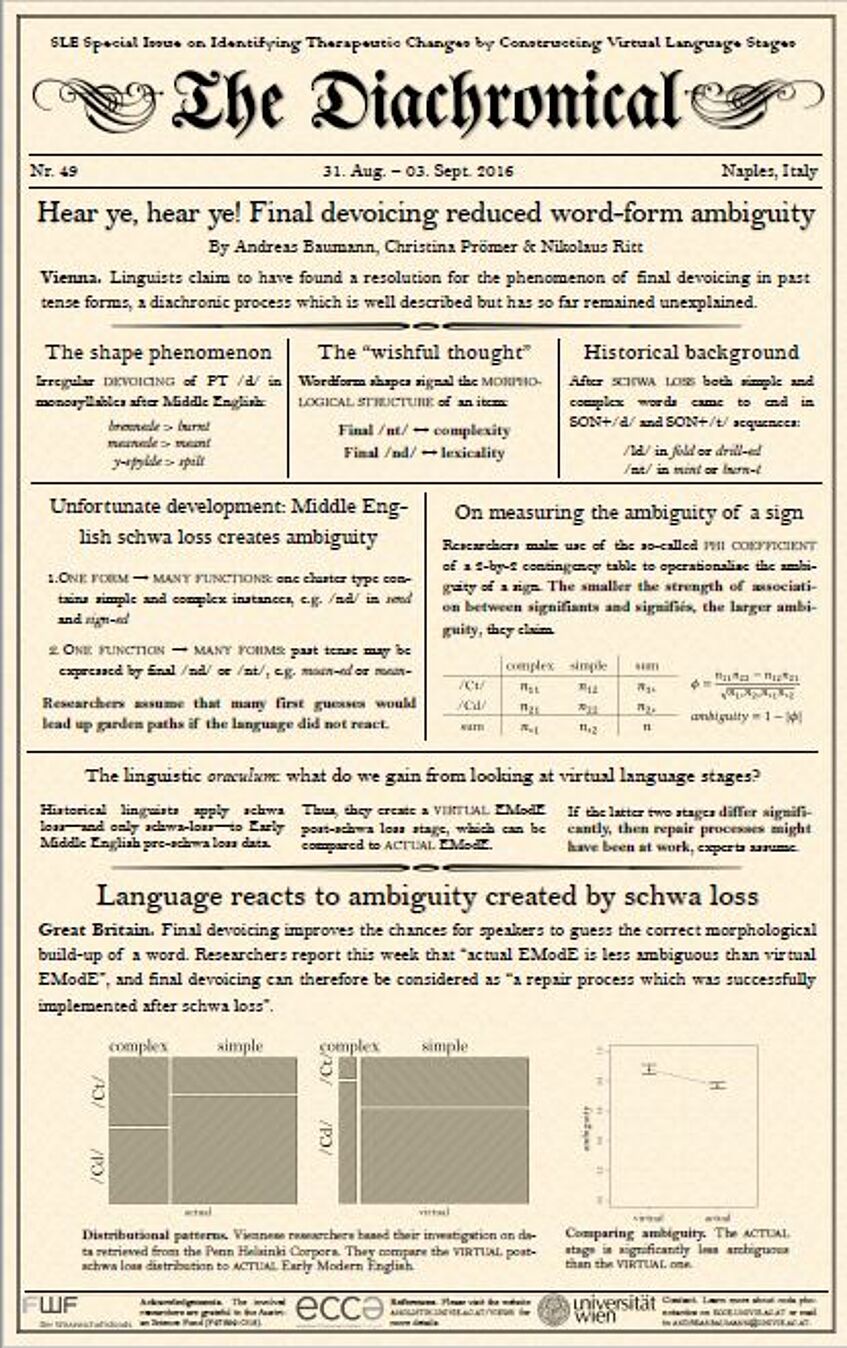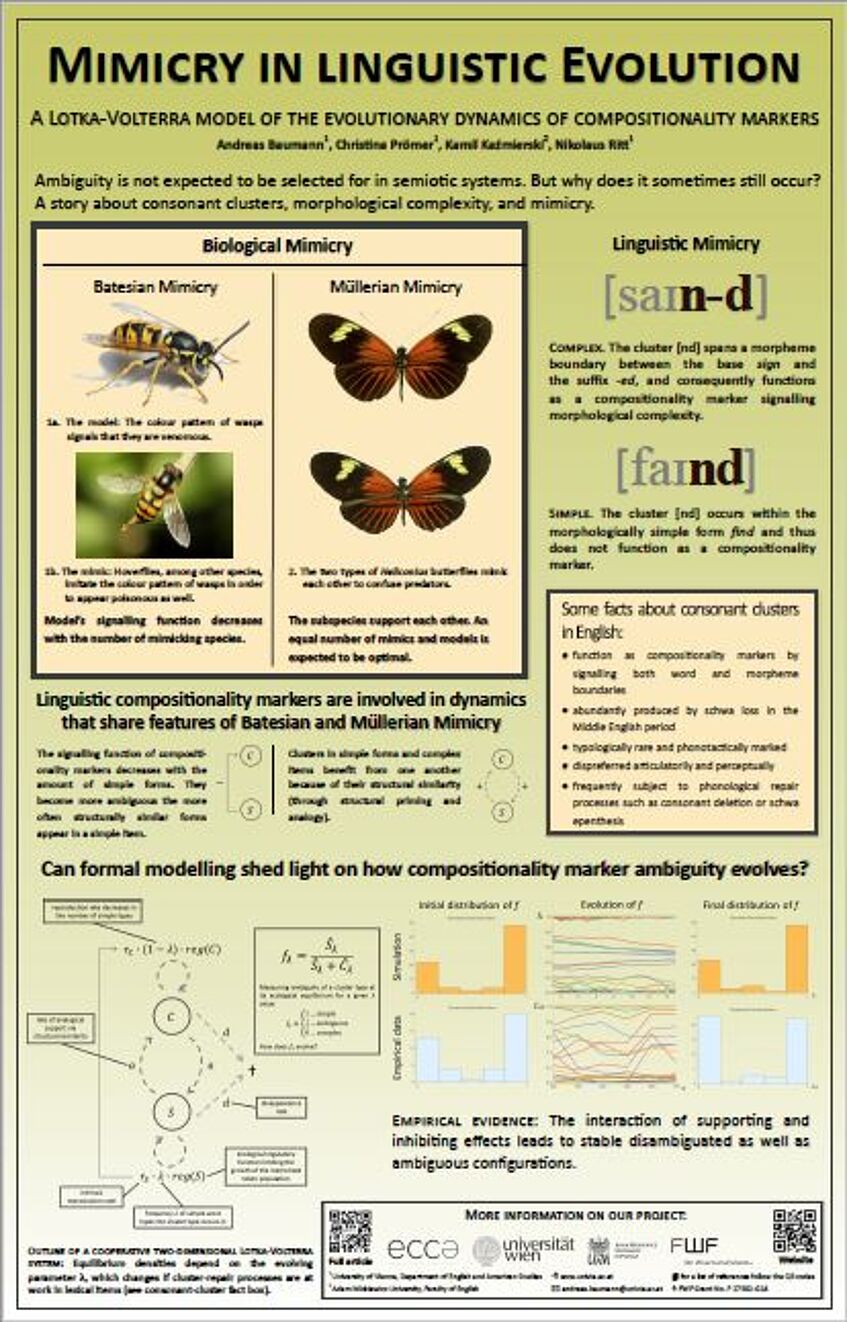Ass. Prof. Mag. Mag. Dr. Andreas Baumann

- Assistant Professor, Digital Linguistics, Department of German Studies, see here
- ORCID: https://orcid.org/0000-0003-4595-2497
- Contact: andreas.baumann@univie.ac.at
- See also: univie.academia.edu/AndreasBaumann
Research interests
- cognitive and evolutionary linguistics (phonology, phonotactics, lexicon, semantics, emotion)
- quantitative linguistics (mathematical, computational, and statistical modeling)
- epidemiological, ecological and evolutionary models in diachronic linguistics
- linguistic diversity and drivers thereof (digitalization, colonialism)
- language, data science, digital humanities, and digital humanism
CV
- Since 11/2023: assistant professor at the Department of German Studies
- Since 12/2023: visiting researcher at the Austrian Center for Digital Humanities and Cultural Heritage (ÖAW)
- Since 07/2023: board member of the Research Network Data Science
- Since 09/2021: lecturer (external expert) at Adam Mickiewicz University, Poznań, Poland
- 07/2024-08/2024: guest researcher at the University of Stellenbosch (South African Center for Epidemiological Modelling an Analysis), South Africa
- 02/2021-10/2023: senior scientist at the Department of European and Comparative Literature and Language Studies; coordinator for Digital Humanities at the Faculty of Philological and Cultural Studies
- 07/2021-09/2021: guest researcher at Università degli Studi di Torino, Italy
- 11/2019-01/2021: postdoctoral assistant at the Department of English
- 05/2019-12/2021: guest researcher at ACDH (Austrian Academy of Sciences), see https://dylen.acdh.oeaw.ac.at/
- 07/2018-12/2020: data scientist (Austrian Social Security, ITSV, Artificial Intelligence)
- 06/2018: Dr. phil. in Cognitive Science (promotio sub auspiciis in 03/2019)
- 02/2015-03/2018: project assistant (ECCE)
- 10/2014-09/2021: lecturer at the Department of English (courses)
- 10/2014-01/2015: guest researcher at the University of Stellenbosch, South Africa
- 05/2011-09/2014: university assistant at the Department of English
- 04/2013: Mag. rer. nat. in Mathematics
- 01/2010: Mag. phil. in General and Applied Linguistics
Publications
- Tiessler, M.; Motger, J.; Piroi, F.; Baumann, A. Forthc. EmoTracker - A New Framework for Modeling and Forecasting Diachronic Emotion Dynamics. Proc. Computational Humanities Research 2025.
- Benson, J.; Zeh, K.; Essfors, H.; Fellner, H.; Neidhardt, J.; Baumann, A. Forthc. Linguistic diversity and digitalization: an ambivalent relationship. Proc. Digital Humanism Interdisciplinary Science and Research Conference 2025.
- Baumann, A.; Hartmann, S. 2026. The chicken and the egg: unraveling aspects of semantic change and how they relate to lexical acquisition. Cognition. https://doi.org/10.1016/j.cognition.2025.106301
- Baumann, A. 2025. Measures of Diachronic Change. Reference Module in Social Sciences. Elsevier. https://doi.org/10.1016/B978-0-323-95504-1.00740-7 Preprint: https://phaidra.univie.ac.at/o:2154974
- Mühlenbernd, R., Baumann, A. 2025. Population-level models of evolutionary pragmatics. In B. Geurts, and R. Moore (eds), Evolutionary Pragmatics: Communicative Interaction and the Origins of Language (Oxford, 2025; online edn). https://doi/10.1093/9780191967566.003.0009
- Baumann, A. 2024. Lexical innovations are rarely passed on during one’s lifetime: epidemiological perspectives on estimating the basic reproductive ratio of words. PLOS One. https://doi.org/10.1371/journal.pone.0312336
- Luz de Araujo, P.; Baumann, A.; Gromann, D.; Krenn, B.; Roth, B.; Wiegand, M. 2024. Proceedings of the 20th Conference on Natural Language Processing (KONVENS 2024). Association for Computational Linguistics, Vienna, Austria, edition. https://aclanthology.org/2024.konvens-main.0
- Baumann, A.; Matzinger, T.; Mühlenbernd, R.; Wacewicz, S.; Pleyer, M.; Hartmann, S.; Placiński, M. 2024. The role of linguistically encoded emotional characteristics for cooperativeness in a one-shot prisoner’s dilemma. In Nölle, J., Raviv, L., Graham, K. E., Hartmann, S., Jadoul, Y., Josserand, M., Matzinger, T., Mudd, K., Pleyer, M., Slonimska, A., Wacewicz, S. & Watson, S. (Eds.): The Evolution of Language: Proceedings of the 15th International Conference (Evolang XV). evolang2024.github.io/proceedings/paper.html
- Baumann, A.; Stephan, A.; Roth, B. 2023. Seeing through the mess: evolutionary dynamics of lexical polysemy. Proceedings of the 2023 Conference on Empirical Methods in Natural Language Processing, 8745–8762. https://aclanthology.org/2023.emnlp-main.541
- Baumann, A.; Hofmann, K.; Marakasova, A.; Neidhardt, J.; Wissik, T. 2023. Semantic micro-dynamics as a reflex of occurrence frequency: a semantic networks approach. Cognitive Linguistics. https://doi.org/10.1515/cog-2022-0008
- Wissing, D.; Baumann, A.; Pienaar, W. 2023. Die vokaalruimtes van Bruinafrikaanse variëteite. LitNet Akademies (Geesteswetenskappe) 20(3). https://doi.org/10.56273/1995-5928/2023/j20n3b1
- Baumann, A.; Bausch, N.; Benson, J.; Bloos, S.; Jablonczay, N.; Kirchmair, T.; Sitter, E. 2023. Grumpiness ambivalently relates to negative and positive emotions in ironic Austrian German text data. Proc. LDK 4. Preprint: https://phaidra.univie.ac.at/o:1655437
- Baumann, A.; Sekanina, K. 2022. Accounting for the relationship between lexical prevalence and acquisition with Bayesian networks and population dynamics. Linguistics Vanguard. https://doi.org/10.1515/lingvan-2021-0038
- Baumann, A.; Mühlenbernd, R. 2022. Less of the same: modeling horror aequi and extravagance as mechanisms of negative frequency dependence in linguistic diversification. Proc. Joint Conference on Language Evolution. https://phaidra.univie.ac.at/o:1590491
- Mühlenbernd, R.; Baumann, A.; 2022. Modeling the origins of communication: alignment of interests and social cues thereof. Proc. Joint Conference on Language Evolution. https://evolang.org/jcole2022/proceedings/paper.html?nr=173
- Kolb, T.; Sekanina, K.; Kern, B.; Neidhardt, J.; Wissik, T.; Baumann, A. 2022. The ALPIN Sentiment Dictionary: Austrian Language Polarity in Newspapers. Proc. LREC. http://www.lrec-conf.org/proceedings/lrec2022/pdf/2022.lrec-1.503.pdf
- Yim, S. B., Wünsche, K.; Cetin, A.; Neidhardt, J.; Baumann, A.; Wissik, T. 2022. Visualizing Parliamentary Speeches as Networks: The DYLEN Tool. Proc. ParlaCLARIN III@ LREC2022 pages, 56(60), 60. http://www.lrec-conf.org/proceedings/lrec2022/workshops/ParlaCLARINIII/pdf/2022.parlaclariniii-1.9.pdf
- Kern, B.; Baumann, A.; Kolb, T.; Sekanina, K.; Neidhardt, J. 2021. A review and cluster analysis of German polarity resources for sentiment analysis. 3rd Conference on Language, Data and Knowledge (LDK 2021): 37:1-37:17. https://doi.org/10.4230/OASIcs.LDK.2021.37
- Baumann, A.; Hofmann, K.; Kern, B.; Marakasova, A.; Neidhardt, J.; Wissik, T. 2021. Exploring causal relationships among emotional and topical trajectories in political text data. 3rd Conference on Language, Data and Knowledge (LDK 2021): 38:1-38:8. https://doi.org/10.4230/OASIcs.LDK.2021.38
- Baumann, A.; Matzinger, T. 2021. Correlates in the evolution of phonotactic diversity in English: linguistic structure, demographics, and network characteristics. Language Sciences. https://doi.org/10.1016/j.langsci.2021.101386
- Kern, B.; Hofmann, K.; Baumann, A.; Wissik, T. 2021. Komparative Zeitreihenanalyse der lexikalischen Stabilität und Emotion in österreichischen Korpusdaten. In C. Katsikadeli, M. Sellner, M. Gassner (Eds.): Digital Lexis and Beyond, Austrian Academy of Sciences Press: Vienna. https://austriaca.at/8916-9
- Sommerer, L.; Baumann, A. 2021. Of absent mothers, strong sisters and peculiar daughters: the constructional network of English NPN constructions. Cognitive Linguistics, 32 (1), 97-131. https://doi.org/10.1515/cog-2020-0013
- Ritt, N.; Baumann, A.; Zöpfl, A.; Zehentner, E. 2020. Reconsidering subjectification from the perspective of animal signalling. Evolutionary Linguistic Theory 2: 139-153. https://doi.org/10.1075/elt.00020.rit
- Hofmann, K.; Baumann, A. 2020. Trochaic bias overrides stress typicality in English lexical development. Journal of Child Language, 1-25. https://doi.org/10.1017/S030500092000046X
- Baumann, A.; Prömer, C.; Ritt, N. 2020. Reconstructing the diffusion of Middle English schwa deletion. Italian Journal of Linguistics, 32.1, 191-210. https://phaidra.univie.ac.at/o:1177527
- Baumann, A.; Kazmierski, K.; Matzinger, T. 2020. Scaling laws for phonotactic complexity in spoken English language data. Language and Speech. https://doi.org/10.1177/0023830920944445
- Hofmann, K.; Marakasova, A.; Baumann, A.; Neidhardt, J.; Wissik, T. 2020. Comparing Lexical Usage in Political Discourse across Diachronic Corpora. In proceedings of the Workshop Creating, Using and Linking of Parliamentary Corpora with Other Types of Political Discourse (ParlaCLARIN II) at LREC 2020, 58-65. https://phaidra.univie.ac.at/o:1082677
- Baumann, A. 2019. Review of Edmondson, William H. 2017: The Sequential Imperative. General Cognitive Principles and the Structure of Behaviour. Language, Mind, Culture and Society 3 (3), 171-176. https://phaidra.univie.ac.at/o:1061765
- Ritt, N.; Baumann, A.; Prömer, C. 2019. The fall and rise of English any. In P. Nunez-Pertejo, M. Lopez-Couso, B. Mendez-Naya, J. Perez-Guerra (Eds.): Crossing Linguistic Boundaries: Systemic, Synchronic and Diachronic Variation in English. Bloomsbury Academic: London. ISBN: 9781350053854
- Baumann, A.; Prömer, C.; Ritt, N. 2019. Word form shapes are selected to be morphotactically indicative. Folia Linguistica 40 (1), 129-151. https://doi.org/10.1515/flih-2019-0007
- Baumann, A.; Neidhardt, J.; Wissik, T. 2019. DYLEN: Diachronic Dynamics of Lexical Networks. In T. Declerck, J. McCrae (Eds.): Proceedings of the Poster Session of the 2nd Conference on Language, Data and Knowledge (LDK-PS 2019). urn:nbn:de:0074-2402-3. http://ceur-ws.org/Vol-2402/paper5.pdf
- Baumann, A.; Wissing, D. 2018. Stabilizing determinants in the transmission of phonotactic systems: diachrony and acquisition of coda clusters in Dutch and Afrikaans. Stellenbosch Papers in Linguistics Plus 55: 77-107. https://doi.org/10.5842/55-0-780
- Baumann, A. 2018. Machine learning in diachronic corpus phonology: mining verse data to infer trajectories in English phonotactics. Papers in Historical Phonology 3: 137-157. https://doi.org/10.2218/pihph.3.2018.2878
- Baumann, A.; Sommerer, L. 2018. Linguistic diversification as a long-term effect of asymmetric priming: an adaptive-dynamics approach. Language Dynamics and Change 2(8): 253 – 296. https://doi.org/10.1163/22105832-00802002 Preprint: http://phaidra.univie.ac.at/o:706999
- Baumann, A.; Kazmierski, K. 2018. Assessing the effect of ambiguity in compositionality signaling on the processing of diphones. Language Sciences 67: 14-32. https://doi.org/10.1016/j.langsci.2018.03.006 Preprint: http://phaidra.univie.ac.at/o:696715
- Baumann, A.; Ritt, N. 2018. The basic reproductive ratio as a link between acquisition and change in phonotactics. Cognition 176: 174-183. https://doi.org/10.1016/j.cognition.2018.03.005 Preprint: http://phaidra.univie.ac.at/o:693259
- Baumann, A. 2018. Linguistic stability increases with population size, but only in stable learning environments. In Cuskley, C., Flaherty, M., Little, H., McCrohon, L., Ravignani, A. & Verhoef, T. (Eds.): The Evolution of Language: Proceedings of the 12th International Conference (EVOLANGXII). Online at: evolang.org/torun/proceedings/papertemplate.html
- Baumann, A.; Ritt, N. 2017. On the replicator dynamics of lexical stress: accounting for stress pattern diversity in terms of evolutionary game theory. Phonology 34: 439-471. https://doi.org/10.1017/S0952675717000240 Preprint: http://phaidra.univie.ac.at/o:707914
- Baumann, A.; Prömer, C.; Ritt, N. 2016. Diachronic dynamics of Middle English phonotactics provide evidence for analogy effects among lexical and morphonotactic consonant clusters. Papers in Historical Phonology 1: 50-75. https://doi.org/10.2218/pihph.1.2016.1693
- Kazmierski, K.; Wojtkowiak, E.; Baumann, A. 2016. Coalescent assimilation across word-boundaries in American English and in Polish English. Research in Language 3: 235–262. https://doi.org/10.1515/rela-2016-0012
- Baumann, A.; Kazmierski, K. 2016. A dynamical-systems approach to the evolution of morphonotactic and lexical consonant clusters in English and Polish. Yearbook of the Poznan Linguistic Meeting 2: 115–139. https://doi.org/10.1515/yplm-2016-0006
- Baumann, A.; Prömer, C.; Kazmierski, K.; Ritt, N. 2016. A Lotka-Volterra model of the evolutionary dynamics of compositionality markers. In S.G. Roberts, C. Cuskley, L. McCrohon, L. Barceló-Coblijn, O. Feher & T. Verhoef (eds.) The Evolution of Language: Proceedings of the 11th International Conference (EVOLANG11).
- Baumann, A.; Prömer, C.; Ritt, N. 2015. Identifying therapeutic changes by simulating virtual language stages: a method and its application to Middle English coda phonotactics after schwa deletion. VIEWS 24: 1-31.
- Baumann, A. 2013. Evolutionary dynamics in structured populations: a life-cycle approach in continuous time. Diploma thesis. Vienna University.
- Ritt, N.; Baumann, A. 2012. Transferring mathematics to English studies. In: M. Manfred and H. Schendl (eds.). Transfer in English studies: 219-237. Vienna: Braumüller. ISBN: 9783700318026
- Baumann, A. 2009. The triggering learning algorithm and the problem of local maxima. Diploma thesis. Vienna University.
Conference presentations and guest talks
- Lenzner, B.; Baumann, A.; Norder, S.; Essl, F.; Fellner, H. 2025. Language endangerment and biodiversity threat both correlate with duration of European colonial occupation. Presentation at Protolang 9, Vienna.
- Baumann, A.; Hartmann, F.; Velaj, Y. 2025. Exploiting epidemiological contact data to examine the role of age structure in linguistic diffusion. Presentation at Protolang 9, Vienna.
- Baumann, A. 2025. Exploiting neural network embeddings in the study of language change. Plenary talk, AI meets Humanities and Social Sciences, ÖAW, Vienna.
- Koppensteiner, W., Baumann, A., Resch, S. 2024. Tracing lexico-semantic competition among lexemes in large text corpora. Poster presentation, AI meets Humanities and Social Sciences, ÖAW, Vienna.
- Baumann, A. 2025. Modeling the diffusion of linguistic innovations. Interdisciplinary Lecture Series in Data Science, TU Wien.
- Baumann, A. 2025. Traditional ODE models of language change driven by individual-level interactions are often not accurate, but we can still learn something from them. Bridging the Gap Workshop, Zürich.
- Zeh, K., Neidhardt, J., Fellner, F., Baumann, A. 2024. Relationships between digitization and linguistic diversity: a roadmap. Zweites Treffen für Digitale Linguistik, Österreichische Linguistiktagung, Innsbruck.
- Baumann, A. 2024. Frequent words are semantically more stable than rare ones: what computational modeling, corpus analysis, and psycholinguistic databases can tell us about lexico-semantic change. SADiLaR DH Colloquium, Potchefstroom, South Africa.
- Baumann, A. 2024. Linguistics and epidemiology: interdisciplinary contact points and intersections. SACEMA Seminar Series, Center for Epidemiological Modeling and Analysis, Stellenbosch, South Africa.
- Baumann, A.; Scheicher, A.; Böhm, I.; Hartmann, S. Aspects of semantic change and how they interact with lexical acquisition. 46th Annual Meeting of the Cognitive Science. Poster session.
- Baumann, A.; Fellner, H. 2024. Measuring linguistic diversity and variation on a global scale and how they were affected by European colonialism. ICLAVE 2024, Vienna.
- Baumann, A., Lenzner, B., Fellner, H. A. & Essl, F. 2024. The relation between European colonialism and linguistic diversity. Poster at EVOLANG XV, Madison, WI.
- Placiński, M., Matzinger, T., Baumann, A., Żywiczyński, P., Hartmann, S., Boehm, I., Pleyer, M. & Wacewicz, S. 2024. Does syntactic alignment predict cooperation? A corpus study of the Prisoner's Dilemma. Poster at EVOLANG XV, Madison, WI.
- Baumann, A.; Matzinger, T.; Mühlenbernd, R.; Wacewicz, S.; Pleyer, M.; Hartmann, S.; Placiński, M. 2024. The role of linguistically encoded emotional characteristics for cooperativeness in a one-shot prisoner’s dilemma. Presentation at EVOLANG XV, Madison, WI.
- Baumann, A. 2024. Lexicon-based emotion analysis in linguistics. Interdisciplinary Lecture Series in Data Science, TU Wien.
- Baumann, A.; Stephan, A.; Roth, B. 2023. Seeing through the mess: evolutionary dynamics of lexical polysemy. Hybrid poster at EMNLP.
- Baumann, A. 2023. Frequency and other correlates of semantic change: digitized diachronic data and computational techniques. Digital Linguistics Workshop, ÖLT, Graz.
- Matzinger, T.; Baumann, A. 2023. Emotional alignment and cooperation in a TV game show. Austrian Meeting on Sentiment Analysis (ÖTSI), ÖLT, Graz.
- Baumann, A. 2023. Non-conformism biases in the cultural evolution of language. Ways to Protolanguage, Rome.
- Baumann, A. 2023. That’s the key! Modeling the effects of non conformist behavior and perceptual granularity on semantic diversification. dsUniVie Talk @ S2023.
- Baumann, A.; Mühlenbernd, R. 2022. Less of the same: modeling horror aequi and extravagance as mechanisms of negative frequency dependence in linguistic diversification. Joint Conference on Language Evolution, Kanazawa.
- Mühlenbernd, R.; Baumann, A. 2022. Modeling the origins of communication: alignment of interests and social cues thereof. Joint Conference on Language Evolution, Kanazawa.
- Baumann, A.; Hofmann, K. 2022. Prevalence-based quantitative analysis of innovations in lexical evolution. Joint Conference on Language Evolution, Kanazawa.
- Baumann, A. 2022. What epidemiology tells us about the relationship between lexical acquisition and change, HPSL Lecture Series, Freiburg, Germany.
- Baumann, A. 2022. Mathematical accounts of language change and evolution. Keynote at VDS Cognition, Behavior and Neuroscience Academy, Vienna, Austria.
- Mühlenbernd, R.; Baumann, A. 2021. Population-Level Models of Evolutionary Pragmatics. Evolutionary Pragmatics Forum, Online.
- Baumann, A. 2021. Exploiting embeddings for analyzing the role of emotion in lexical change. Modelling Constructional Variation and Change, Zürich.
- Soukup, B.; Baumann, A. 2021. English in the Linguistic Landscape of Vienna, Austria (ELLViA) – A variationist linguistic landscape study project, its methods, and some findings. Quantitative Linguistic Landscape Research 2.0: Variationist Linguistic Landscape Study, Vienna.
- Baumann, A. 2021. On the role of emotion in lexical reproduction. SLE 2021. https://osf.io/ph8kd/
- Baumann, A. 2021. Aspects of lexical reproduction: drift, dispersion, and emotion. Università degli Studi di Torino, August 27th, 2021.
- Kern, B.; Baumann, A.; Kolb, T.; Sekanina, K.; Neidhardt, J. 2021. A review and cluster analysis of German polarity resources for sentiment analysis. LDK 2021.
- Baumann, A.; Hofmann, K.; Kern, B.; Marakasova, A.; Neidhardt, J.; Wissik, T. 2021. Exploring causal relationships among emotional and topical trajectories in political text data. Poster at LDK 2021. https://phaidra.univie.ac.at/o:1366663
- Baumann, A. 2021. Long-term effects of valence, concreteness, and arousal on lexical reproduction. Poster at CogSci 2021. https://phaidra.univie.ac.at/o:1366706
- Baumann, A.; Ritt, N. 2020. Abundance and other correlates of linguistic stability: formal predictions and evidence from sparse lexical items. SLE 2020.
- Hofmann, K.; Marakasova, A.; Baumann, A.; Neidhardt, J.; Wissik, T. 2020. Relating change in Austrian political discourse to real-world events through analyzing big diachronic corpus data. 4th International Conference on Political Linguistics, Łódź.
- Baumann, A.; Marakasova, A.; Hofmann, K.; Neidhardt, J.; Wissik, T. 2020. Semantic shifts in Austrian public discourse: A lexical networks approach. Annual Conference of the German Linguistic Society (DGfS), Hamburg.
- Matzinger, T.; Baumann, A.; Kazmierski, K. 2019. Phonotactics is affected by statistical scaling laws less than the lexicon. ICLC 15, Nishinomiya.
- Baumann, A.; Kazmierski, K. 2019. Contributions of articulatory contrast to the quality of consonant sequences: a meta study. Approaches to Phonology and Phonetics 2019, Lublin.
- Baumann, A.; Neidhardt, J.; Wissik, T. 2019. DYLEN: Diachronic dynamics in lexical networks. Language, Data & Knowledge 2, Leipzig. https://phaidra.univie.ac.at/o:971115
- Baumann, A. 2018. Towards a standardized measurement of linguistic stability. 20th ICL, Cape Town.
- Baumann, A., Matzinger, T. 2018. Ecological and linguistic correlates of the dynamics of phonotactic diversity: a diachronic case study. 20th ICL, Cape Town.
- Baumann, A. 2018. Linguistic stability increases with population size, but only in stable learning environments. Evolang 12, Torun.
- Baumann, A.; Matzinger, T. 2018. Linguistic and non-linguistic correlates in the evolution of phonotactic diversity. Evolang 12, Torun.
- Ritt, N.; Prömer, C.; Baumann, A.; Kazmierski, K. 2017. Phonotactic word form shapes are selected to be morphotactically indicative. Diachronic phonotactics workshop, Vienna.
- Baumann, A.; Sommerer, L. 2017. Layering an effect of asymmetric priming. 23rd ICHL, San Antonio, TX.
- Baumann, A.; Prömer, C. 2017. Interpolating diachronic phonotactic data: On the logistic spread of Middle English schwa loss. 23rd ICHL, San Antonio, TX.
- Kazmierski, K.; Baumann, A. 2017. Perceptual effects of ambiguity in the long-term development of boundary-signaling consonant clusters: combining experiments and dynamical systems in (mor)phonotactic research. Dynamic Modeling Workshop, Cologne.
- Baumann, A.; Sommerer, L. 2017. Layering as a long-term effect of asymmetric priming. 14th ICLC, Tartu.
- Baumann, A. 2017. Early acquired sound sequences spread, late ones don't. 14th ICLC, Tartu. http://phaidra.univie.ac.at/o:661781
- Baumann, A.; Kazmierski, K. 2017. Lazy speakers and distant sounds: on the role of articulatory difference in phonotactic production, acquisition and change. PaPE, Cologne. http://phaidra.univie.ac.at/o:661780
- Baumann, A. 2017. Manner of articulation is the primary articulatory pressure in the formation of phonotactic systems: evidence from the acquisition and diachrony of Dutch and Afrikaans. Phon & Phon meeting, AMU, Poznan.
- Kazmierski, K.; Baumann, A. 2016. Assessing the effect of compositionality-signaling variability on the segmentation function and processability of diphones. Experimental Approaches to Perception and Production of Language Variation, Vienna.
- Hofmann, K.; Baumann, A. 2016. The effect of differential stress patterns on age-of-acquisition ratings in English. SLE, Naples.
- Baumann, A.; Prömer, C.; Ritt, N. 2016. Identifying therapeutic changes by constructing virtual language stages. SLE, Naples. http://phaidra.univie.ac.at/o:661778
- Baumann, A. 2016. Stabilizing determinants in the transmission of phonotactic systems: on the emergence of the Afrikaans consonant-cluster inventory. Afrikaans Grammar Workshop, Johannesburg.
- Zehentner, E.; Baumann, A.; Ritt, N.; Prömer, C. 2016. A Game Theoretic Account Of Semantic Subjectification In The Cultural Evolution Of Languages. Evolang XI, New Orleans.
- Baumann, A.; Prömer, C.; Kazmierski, K.; Ritt, N. 2016. A Lotka-Volterra model of the evolutionary dynamics of compositionality markers. Evolang XI, New Orleans. http://phaidra.univie.ac.at/o:661779 and evolang.org/neworleans/papers/17.html
- Baumann, A.; Prömer, C.; Ritt, N. 2015. Diachronic reflexes of frequency effects among word final (mor)phonotactic consonant clusters in Middle and Early Modern English. 3rd International Workshop on Phonotactics and Phonotactic Modeling, Vienna.
- Prömer, C.; Baumann, A.; Ritt, N. 2015. Sporadic final devoicing in English past tense forms ending in [sonorant]+/d/ clusters: a 'therapeutic' response to schwa loss. 3rd International Workshop on Phonotactics and Phonotactic Modeling, Vienna.
- Ritt, N.; Baumann, A. 2015. Evolutionäre Spieltheorie in der historischen Sprachwissenschaft. Grammar, Cognition and Language: Dahlem Lectures in Linguistics, FU Berlin.
- Baumann, A.; Kazmierski, K. 2015. A structured-population dynamical-systems approach to the evolution of morphonotactic and lexical consonant clusters. PLM, Poznan.
- Ritt, N.; Kazmierski, K.; Baumann, A.; Prömer, C. 2015. Phonology-morphology interaction and the emergence of /VVCC/-rhymes in the English lexicon. SLE, Leiden.
- Baumann, A.; Prömer, C.; Ritt, N. 2015. Therapeutic responses to Early Middle English schwa loss in the domain of morphonotactics. SLE, Leiden.
- Baumann, A. 2014. Mathematical modelling of language change: what is the point of all this? University of Stellenbosch, South Africa.
- Baumann, A. 2014. Languages as eco-evolutionary systems: why it sometimes still makes sense to compare linguistic change with disease. SACEMA, Stellenbosch, South Africa.
- Baumann, A. 2014. Rhythm-driven evolutionary dynamics of lexical stress in natural languages. EvoMus Workshop, Evolang X, Vienna, Austria.
- Baumann, A. 2013. When uniform stress placement collapsed: the history of English word stress told by Evolutionary Game Theory, Oslo, Norway.
- Baumann, A. 2013. Eco-evolutionary dynamics of linguistic replicators. Ways to Protolanguage 3, Wroclaw, Poland.
- Baumann, A. 2012. Grammaticalizing to death: evolutionary suicide of OE/ME case markers. Memetics Workshop, Vienna, Austria.
- Baumann, A. 2012. Grammatikalisierung, Optimierung und Unidirektionalität. OELT 39 (Österreichische Linguistiktagung), Innsbruck, Austria.
- Baumann, A. 2012. Struggle for rhythm: an evolutionary approach to stress assignment. PLM (43rd Poznan Linguistic Meeting), Poznan, Poland.
- Baumann, A. 2012. Grammaticalization and evolutionary optimization. NRG 5 (New Reflections on Grammaticalization), Edinburgh, Scotland.
- Baumann, A. 2012. Grammatikalisierung als evolutionärer Optimierungsprozess. Zweiter Workshop "Sprachwissenschaftliche Dissertationsprojekte der Wiener Germanistik", Vienna, Austria.
- Ritt, N. Baumann, A. 2011. Lexical stress, game theory and utterance rhythm. SLE 44 (Societa Linguistica Europaea), Logrono, Spain.
Prizes, grants and funding
- Data Science @ Uni Vienna seed grant together with Yllka Velaj, https://datascience.univie.ac.at/research/seed-grants/ (01/2025)
- WWTF project grant, Information and Communication Technologies 2013: Digital Humanism; PI; "Disentangling effects of digitization on linguistic diversity" (10.47379/ICT23012), https://www.wwtf.at/funding/programmes/ict/ICT23-012/ (06/2024)
- Best poster award (1st prize), Language, Data and Knowledge 4, Vienna (09/2023)
- Travel grant; ÖFG (06/16374)
- Digital Humanism project grant; Stadt Wien MA 7; Co-PI; "Dynamic sentiment analysis as emotional compass in the digital media landscape" (11/2019)
- Dissertation award of the Faculty of Philosophy (06/2019)
- Promotion award of the Vienna Language Society (04/2019)
- Stipend of excellence; Austrian Ministry of Science, Research and Economy (03/2019)
- GoDigital! project grant; Austrian Academy of Sciences; Co-PI; "Diachronic dynamics of lexical networks", see https://dylen.acdh.oeaw.ac.at/ (12/2018)
- Travel grant; ÖFG (07/2018)
- Dissemination/travel grant (pre doc); Research Services and Career Development, University of Vienna (07/2018)
- Travel grant; ÖFG (08/2017)
- Best poster award (2nd prize); 49th SLE, Naples (09/2016)
- VivA travel grant, Virtuele Instituut vir Afrikaans (08/2016)
- Evolang poster prize (1st prize), Evolang XI, New Orleans (04/2016)
Teaching
- PS SpraWi: Digitale Linguistik: Einführung in die Datenanalyse (WS24/25)
- KO Sprachgeschichte des Deutschen: Quantitative Modellierung lexikalischen Wandels (WS24/25)
- SE SpraWi: Digitale Linguistik - Datenbanken in der sprachwissenschaftlichen Forschung (SS24, SS25)
- UE Crowd sourcing in the humanities (SS23)
- UE Statistical modeling for DH with R (WS22/23, WS23/24)
- VO Quantitative methods in Digital Humanities (WS21/22/23, SS23, SS24, SS25)
- AR Emotion analysis in social media (WS21)
- Natural language processing in R (AMU Poznan, WS21, SS23)
- FS Research seminar: Stylometry and authorship attribution (SS21)
- SE BA Seminar: Linguistic complexity and population size (SS21)
- PS Proseminar linguistics 2: Cognition and corpus linguistics (WS20/21)
- Natural language processing and machine learning (AMU Poznan, June 2020)
- Interdisciplinary lecture series on data science (TU Wien, June 2020, June 2022)
- PS Proseminar linguistics 2: Language and artificial intelligence (SS20)
- Introduction to text mining (VDA Theory and Methods in the Humanities, May 2019) [course materials]
- AR Applied data science for linguists (SS19/20/23)
- SE Staff seminar linguistics (WS17/18)
- Statistical modeling and multimodel inference (AMU Poznan, December 2017)
- Introducing statistics module (Poznan, December 2017)
- AR Introduction to statistical modeling for linguists (SS17)
- SE Staff seminar: Approaching statistical problems in English language studies with R (WS16/17)
- AR Introduction to statistics for linguists (WS14/15, WS15/16)
- AR Statistics module in "Research methods in linguistics" (WS13/14, SS14, WS15/16, SS16, WS16/17, SS17, WS17/18, WS19/20)
- AR Quantitative and statistical methods (WS13/14)
- PS Proseminar linguistics 1 (WS12/13, SS13, SS14)
- SE Introduction to evolutionary linguistics (SS12)

